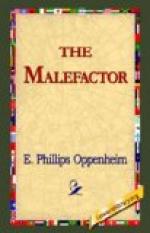Was it he indeed—George Richardson? He doubted it. The world of tape measures and calico counters seemed so far away; the interior of his quondam lodgings in a by-street of Islington, so unfamiliar and impossible. He felt himself swallowed up in this new and bewildering existence, of which he was so insignificant an atom, the existence where tragedy reared her gloomy head, and the shadows of great things loomed around him. Down there in the cold restless waste of black waters—what was it that he saw? The sweat broke out upon his forehead, the blood seemed turned to ice in his veins. He knew very well that his fancy mocked him, that it was not indeed a man’s white face gleaming on the crest of the waves. But none the less he was terrified.
Mr. Richardson was certainly nervous. Not all the brandy he had drunk—and he had never drunk half as much before in his life—afforded him the least protection from these ghastly fancies. The step of a sailor on the deck made him shiver; the thought of his empty state room was a horror. He tried to think of the woman at whose bidding he had left behind him Islington and the things that belonged to Islington! He tried to recall her soft suggestive whispers, the glances which promised more even than her spoken words, all the perfume and mystery of her wonderful presence. Her very name was an allurement. Mademoiselle Violet! How softly it fell from the lips! . . . God in heaven, what was that? He started round, trembling in every limb. It was nothing more than the closing of the smoking room door behind him. Sailors with buckets and mops were already beginning their nightly tasks. He must go to his state room! Somehow or other, he must get through the night . . .
He did it, but he was not a very prepossessing looking object when he staggered out on deck twelve hours later, into the noon sunshine. The chair towards which he looked so eagerly was occupied. He scarcely knew himself whether that little gulp of acute feeling, which shot through his veins, was of relief or disappointment. While he hesitated, Wingrave raised his head.
Wingrave did not, as a rule, speak to his fellow passengers. Of Richardson, he had not hitherto taken the slightest notice. Yet this morning, of all others, he addressed him.
“I believe,” he said, holding it out towards him, “that this envelope is yours. I found it under your chair.”
Richardson muttered something inarticulate, and almost snatched it away. It was the envelope of the fatal letter which Mademoiselle Violet had written him to Queenstown.
“Sit down, Mr. Richardson, if you are not in a hurry,” Wingrave continued calmly. “I was hoping that I might see you this morning. Can you spare me a few minutes?”
Richardson subsided into his chair. His heart was thumping against his ribs. Wingrave’s voice sounded to him like a far-off thing.
“The handwriting upon that envelope which I have just restored to you, Mr. Richardson, is well known to me,” Wingrave continued, gazing steadfastly at the young man whom he was addressing.




